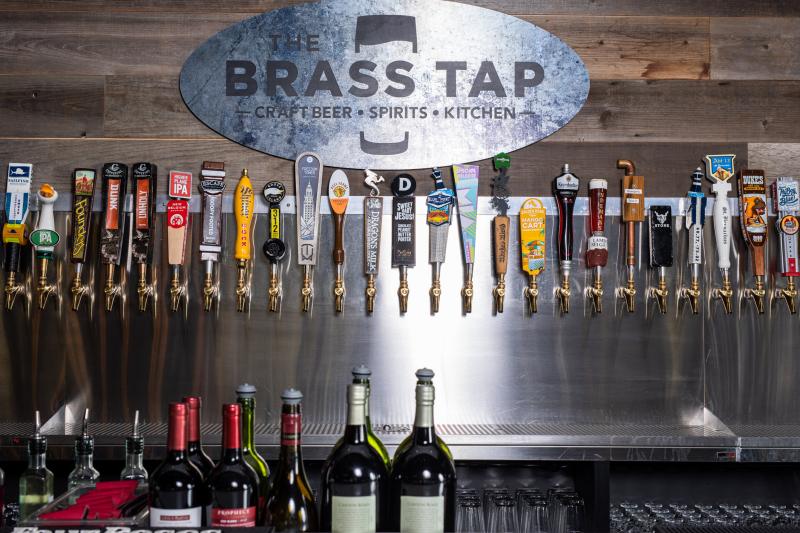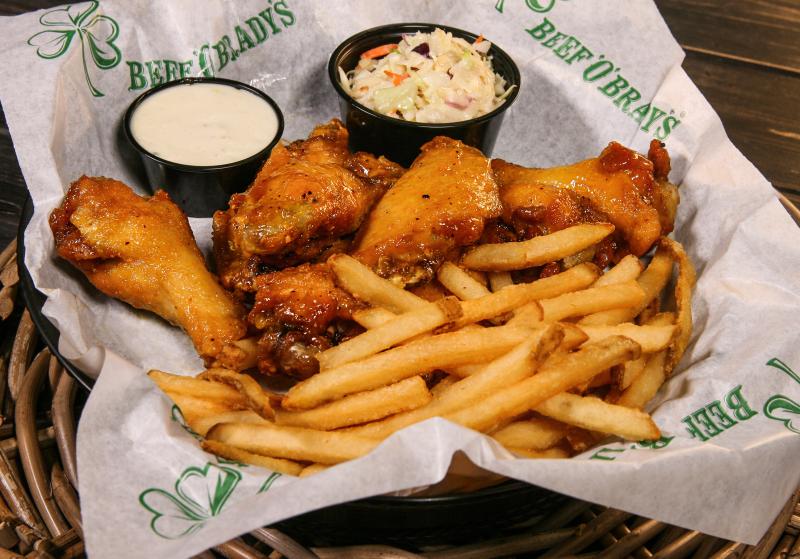Beef ‘O’ Brady’s and The Brass Tap had a record year in 2023. The franchisor opened 10 Brass Tap locations and one Beef ‘O’ Brady’s, and it awarded another 36 and four, respectively.
Beef ‘O’ Brady’s has a total of 143 locations in 21 states, and it’s a family sports pub concept. The Brass Tap is a craft beer bar and entertainment venue – known for its extensive, localized brewery offerings, specialty cocktails, premium wines, and upscale shareables – and it has 40 locations in 16 states. Both are examples of successful franchises, and they offer inspiration for bar and restaurant owners who are considering the franchise model as a franchisor (or even as a franchisee). (Note: A franchisor owns a licensed business model, and a franchisee operates the business and pays the franchisor to use that business model.)

Chris Elliott, CEO of FSC Franchise Co., the franchisor behind Beef ‘O’ Brady’s and The Brass Tap, said, “2023 was another successful year for us. Beef ‘O’ Brady’s had five percent comp sales growth on top of five percent sales growth the previous year, so two good years. That made 11 out of the last 13 years positive comps for Beef ‘O’ Brady’s. Those years that were negative were COVID years. ‘Beef’ is doing extremely well; their averaging volumes were up $100,000. The Brass Tap rolled over some big numbers in 2022.”
Elliot said the overall secret to success for the franchisor is picking the right franchisee. “The No. 1 ingredient is who the franchisee is and how they approach the business,” he said. “Secondary to that [for the franchisee] would be doing the basics correctly, which would be pick the right site, the right location, and to operate it effectively. From the franchisor side, it’s staying on trend or staying ahead of trends, in terms of your menu and your price/value equation. It’s also about asking what’s next – where’s the industry going, where’s the consumer going? And making sure that your offerings, your facilities and menus, and your pricing and marketing are on top of where things are trending.”
Becoming a Franchisor Is "Worthwhile for the Well-organized Owner"

Hospitality Works’ Izzy Kharasch, a restaurant industry consultant in Chicago, believes that every bar and restaurant owner wants to be a franchisor. “It is certainly worthwhile for the well-organized owner,” he said. “It gets the brand recognized and the owner will make a percentage of sales from each unit. A well-done franchise will grow based on its reputation for food/bar/service.”
Kharasch – who has a great deal of experience with the franchise model and franchise compliance, including testifying in court as an industry expert – said operators who consider franchising need to be profitable, organized, and have solid, repeatable systems in place. If done well, the bar or restaurant can become very successful, profiting from every unit that’s opened and a percentage of sales, as well as products that are purchased by the franchisee.

Mark Moeller, founder and president of The Recipe of Success, a national restaurant consulting firm, said how successful or profitable a bar or restaurant brand becomes depends on the concept and the execution by all parties involved. “Often there is a critical mass of opened locations before a franchisor can recognize significant profitability,” he shared. Moeller has held senior leadership positions with both franchisors and franchisee organizations, and his company offers franchise development consulting.
Greg Provance, owner of GP Hospitality Partners LLC and several restaurants in the San Diego area, pointed out that most concepts can do well with franchising, but operators need to consider the cost to build, scalability, the ability to duplicate systems, and overall operational blueprint. “QSR and fast-causal concepts tend to check these boxes readily,” he said.

Provance – who built a franchise model for his own brand and assists clients across multiple concepts and markets with franchising – explained that franchising is a way to scale more quickly while leveraging capital (both monetary and human capital). “Simply put, others will build and operate your brand, allowing you as a franchisor to build out multiple markets with less burden of capital and resources and utilizing the power of partnerships,” he said.
According to Moeller, franchise fees typically average 8 to 10 percent and average net profits generated at a bar concept range from 10 to 20 percent. If a bar averages at the top end of that range, they may be attractive to potential franchisees.
"A bar [or restaurant] may consider the franchise model if they are looking to grow their brand and do not want to lay out the initial capital to do so,” said Moeller. “Franchising is a great way to expand one’s brand and add to their annual income through royalty fees.”
What Does It Take for a Bar or Restaurant Owner to Become a Franchisor?
To become a franchisor, Provance said a brand owner will need to make sure they have systems and processes in place that can be easily reproduced.
"Franchisees will need a system to follow to ensure consistency across the brand in multiple markets,” said Provance. “You should also ensure that your proof of concept is successful. It will likely be difficult to scale and duplicate a brand that has problems with profitability, operational issues, or issues of relevance in the marketplace.”
Moeller pointed out that it all takes a lot of common sense and attention to detail. “In order to grow a franchise business, the franchisor must have well documented systems and structure, including training programs and manuals, an operation manual [such as standard operating procedures], detailed recipes that are easily replicable, a solid marketing plan and vision, an understanding of required demographics, funding and working capital, leadership skills, and so much more,” he said.
Common Mistakes to Avoid, Tips, and Advice
Kharasch said there are some common mistakes that bars and restaurants make when becoming a franchisor. “They underestimate the amount of work it takes to make your current model franchisable,” he shared. “In addition, they don’t put in all of the necessary restrictions and rules for the franchisee, so that when a franchisee goes off on their own, the franchisor has no recourse.”
Kharasch said oftentimes the biggest surprise to owners is the legal cost to get the franchisor/franchisee model started. “If they are planning on going national, they have to keep in mind that each state has their own laws regarding franchising,” he said. “Next, they need to really have their own house in order – unique interior design, well organized systems, great training, and a full understanding of the demographics.”

Kharasch said the process can get tricky. “There are great concepts that have tried to franchise but were not successful,” he revealed, noting that it’s all about being well organized. “The owners need to be prepared to be the ‘franchise police.’ The franchise owners need to ensure that the franchisees are following all of the rules. Many franchises fail because the franchisees begin purchasing from outside of the contract, make up their own recipes, and essentially ignore everything that made the franchise unique.”
While Kharasch said a definite pro for franchising is that a franchisor can build a brand and become highly profitable, the downside of franchising is when the franchisee does not follow the rules. They end up hurting the brand, especially in the age of social media.
Moeller said the lack of control of the individual locations can certainly become an issue, as the franchisees are not the franchisor’s employees and sometimes do their own thing.
“Some of the most common issues include not vetting out potential franchisees well, not creating systems and structure that go beyond what is required by the Federal Trade Commission, not securing proper funding, not having the right internal team in place, not holding franchisees accountable for their violations of the Franchise Disclosure Document, not ensuring their brand is transferable to different markets, not growing smartly – meaning they do not have a plan to grow from their location out gradually,” said Moeller, who believes identifying those companies and/or individuals who you are going to entrust your brand to is key.
Provance said it’s essentially a two way street, as franchisors need to support franchisees in a meaningful way with marketing, training, operational support, etc., “…all important factors that cannot be forgotten,” he said.
Beyond the typical and expected advice, Moeller said it’s imperative that a bar or restaurant operator knows its business inside and out. “You should be able to answer every question when it comes to the financial picture and performance of the company, including the ebb and flow of each number.”
Kharasch said operators should do their “homework” before they venture down the franchisor path, especially in terms of the legal requirements to get the franchise model up and running, “…go to a franchise show and see what companies are selling franchises, what they offer, what they charge, and what you as a franchisee can make,” said Kharasch. “This will help you understand how to put together a franchise and, more importantly, how to sell your franchise concept.”
According to Provance, when considering the franchise model, it’s important to understand that, while fast growth is possible, it is far more important to ensure that you partner with the right operators to ensure success.
“There is a lot of money out there and many investors are looking for turnkey solutions,” said Provance. “That is to say, they will throw a lot of money at a brand to buy a store or even a territory, but with little to no expertise in actually running an operation. This can spell disaster for franchisors in the long run. It may slow growth overall, but by finding and recruiting operators who are dedicated to supporting the brand long term, you will find greater success.”

Before You Franchise, Whose Advice Should You Seek?
Provance said there are many consultants and experts who can help operators navigate the “ins and outs” of franchising a brand. “Be sure to ask for references from their clients and ask a lot of questions about what to expect before engaging their services,” he said, “but it is recommended that you seek advisory, especially if this is your first-time franchising. Many of these advisors work with legal teams for filings and contracts, but if not, you will also need a legal professional to ensure all documents are drafted and filed properly.”
Moeller said bars and restaurants should first and foremost partner with a capable consultant with experience in franchise development, as well as a franchise attorney, and a CPA with experience in the hospitality franchising space.
Aaron Kiel is an editor, writer and public relations professional in Raleigh, N.C. He’s worked in the beverage, tea and coffee industries for two decades, as well as hospitality and technology. He’s a journalist at heart, but he also wears a PR and communications hat through his consultancy, ak PR Group. He’s a contributing writer/reporter for Questex’s Bar & Restaurant News, and he recently worked as the editor of World Tea News with Questex’s Bar & Restaurant Group. In 2023, he was a finalist and honorable mention in the “Folio: Eddie & Ozzie Awards” for Range of Work by a Single Author – B2B.” In 2024, he was named a Northeast Regional Finalist in the Editorial Excellence category for Diversity Equity & Inclusion, for his article on Pride Month and the hospitality industry at Bar & Restaurant News. Connect with him on Instagram: @adventurer_explorer.
Are you registered for our Crave and Crave on the Menu newsletters? Sign up today!
Plan to Attend or Participate in the 2025 Bar & Restaurant Expo, March 24-26, 2025
To learn about the latest trends, issues and hot topics, and to experience and taste the best products within the bar, restaurant and hospitality industry, plan to attend Bar & Restaurant Expo 2025 in Las Vegas. Visit BarandRestaurantExpo.com.
To book your sponsorship or exhibit space at the 2025 Bar & Restaurant Expo, contact:
Veronica Gonnello (for companies A to G) e: [email protected] p: 212-895-8244
Tim Schultz (for companies H to Q) e: [email protected] p: 917-258-8589
Fadi Alsayegh (for companies R to Z) e: [email protected] p: 917-258-5174
Also, be sure to follow Bar & Restaurant on Facebook and Instagram for all the latest industry news and trends.
